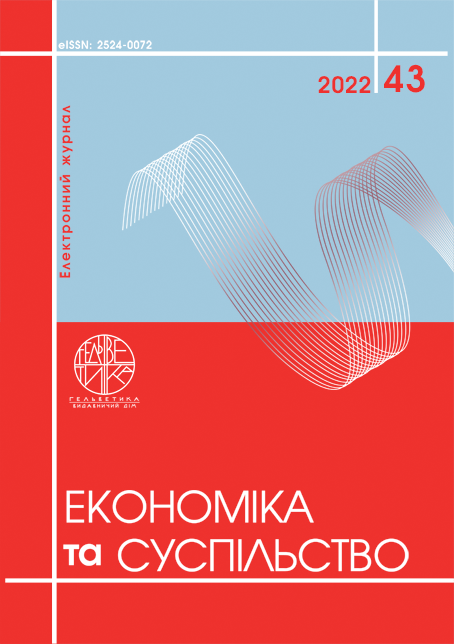LABOR PRODUCTIVITY IN THE INTENTIONAL ECONOMY
Abstract
The importance of the topic of the article is due to the deepening of economic relations and the complication of problems of labor management and its efficiency. The purpose of the study is to substantiate the purpose and functions of labor productivity in the conditions of the intentional economy. It has been proven that work is a systemic and at the same time multi-element phenomenon: first of all, work is a) a resource, b) a factor of economic activity, c) a defining element of the economic system, d) one of the spheres of the emergence and implementation of economic relations. Secondly, human labor is the basis of the development of society, therefore the pace and result of development depends on the efficiency of labor. Thirdly, work is an element of the culture of society or an individual enterprise, acting as a result of the influence of existing values, norms, and rules. Labor productivity can be presented in a narrow and broad sense. In a narrow sense, labor productivity as a mirror of the efficiency of the use of human potential shows the amount of products produced by one worker. In a broad sense, labor efficiency characterizes the result of the development of human potential and the quality of its use. Labor productivity is a basic concept of economic relations, it acts as an economic category that characterizes the effectiveness and efficiency of the use of human potential. Labor productivity in an intentional economy, that is, an economy based on intentions and explaining the behavior of participants in economic actions from the standpoint of intentions, is a systemic concept that concentrates synergistic levers (self-development, self-learning, and self-organization) and cybernetics levers. The article highlights the following functions of labor productivity. The economic function allows you to evaluate the effectiveness of intentions and their implementation in specific production conditions; managerial function: labor productivity shows the extent to which the employee's behavior and intentions are oriented towards the coordination of their own intentions and the production task, business goal; function of cultural transformations. The intentions of a person as a whole and a worker on time are a reflection of the cultural background, therefore labor productivity in the intentional economy is a manifestation of the culture of intentions and the culture of the implementation of intentions in the process of economic activity. In further research, it is planned to build a model of the influence of labor productivity functions on the efficiency of the economic system.
References
Kubiniy N., Zavadyak R., Hudzovata L. The human factors of the national economic development: a comparative analysis of Poland and Ukraine. Conference Proceedings – VIII International Scientific Conference Determinants of Regional Development. 2021. № 2. P. 331–334.
Burda M. Aggregate labor productivity. IZA.World of labour: web-site. URL: https://wol.iza.org/articles/aggregate-labor-productivity/long
Jan Sauermann Performance measures and worker productivity. IZA. World of labour: web-site. URL: https://wol.iza.org/search?types%5B0%5D=1&search_phrase=How+does+monetary+policy+affect+labor+demand+and+labor+productivity%3F&synonyms%5B0%5D=politician&synonyms%5B1%5D=minister&synonyms%5B2%5D=policymaker&synonyms%5B3%5D=policymaker&synonyms%5B4%5D=labor&synonyms%5B5%5D=labour&synonyms%5B6%5D=Fern%C3%Andez-Huertas+Moraga&synonyms%5B7%5D=Fernandez-Huertas+Moraga&ynonyms%5B8%5D=labor&synonyms%5B9%5D=labour
Рубцов А., Погребняк А. Роль мотиваційного механізму підвищення продуктивності праці персоналу в рамках реалізації кадрової політики на підприємстві. Актуальні проблеми економіки та управління. 2015. № 9. URL: http://ape.fmm.kpi.ua/article/view/41663
Харцій А., Сохач С. Підвищення продуктивності праці через стимулювання працівників за сучасних умов господарювання. Ефективна економіка. 2009. № 3. URL: http://www.economy.nayka.com.ua/?op=1&z=66
Мікловда В.П., Кубіній Н.Ю., Мошак С.М. Рейтинг конкурентоспроможності України за критерієм ефективності праці. Демографія та соціальна економіка. 2015. № 3. С. 199–208.
Кубіній Н.Ю. Філософський бекгроунд імовірності як категорії інтенціальної нано-економіки. Науковий вісник Ужгородського університету. Сер. Економіка. 2021. Вип. 57. С. 48–53.
Шерінг: сучасний тренд, що відкриває майбутнє. Мукачеквонет: веб-сайт. 24 жовтня 2022. URL: https://www.mukachevo.net/ua/news/index
Потоцька О.А., Побережна Н.М. Продуктивність праці: сутність та функції. Інформаційні технології: наука, техніка, технологія, освіта, здоров’я. 2019. Ч. ІІІ. URL: https://core.ac.uk/download/pdf/210556958.pdf
Kubiniy N., Zavadyak R., Hudzovata L. (2021) The human factors of the national economic development: a comparative analysis of Poland and Ukraine. Conference Proceedings – VIII International Scientific Conference Determinants of Regional Development, vol. 2, pp. 331–334.
Burda M. Aggregate labor productivity. IZA.World of labour: web-site. Available at: https://wol.iza.org/articles/aggregate-labor-productivity/long
Jan Sauermann Performance measures and worker productivity. IZA. World of labour: web-site. Available at: https://wol.iza.org/searchtypes%5B0%5D=1&search_phrase=How+does+monetary+policy+affect+labor+demand+and+labor+productivity%3F&synonyms%5B0%5D=politician&synonyms%5B1%5D=minister&synonyms%5B2%5D=policymaker&synonyms%5B3%5D=policymaker&synonyms%5B4%5D=labor&synonyms%5B5%5D=labour&synonyms%5B6%5D=Fern%C3%Andez-Huertas+Moraga&synonyms%5B7%5D=Fernandez-Huertas+Moraga&yn onyms% 5B8%5D=labor& synonyms%5B9%5D=labour
Rubtsov A., Pohrebniak A. (2015). Rol motyvatsiinoho mekhanizmu pidvyshchennia produktyvnosti pratsi personalu v ramkakh realizatsii kadrovoi polityky na pidpryiemstvi [The role of the motivational mechanism of increasing the labor productivity of the personnel within the framework of the implementation of the personnel policy at the enterprise]. Aktualni problemy ekonomiky ta upravlinnia – Actual problems of economy and management, vol. 9. Available at: http://ape.fmm.kpi.ua/article/view/41663 (in Ukrainian)
Khartsii A., Sokhach S. (2009). Pidvyshchennia produktyvnosti pratsi cherez stymuliuvannia pratsivnykiv za suchasnykh umov hospodariuvannia [Increasing labor productivity through employee stimulation under modern business conditions]. Efektyvna ekonomika – Efficient economy, vol. 3. Available at: http://www.economy.nayka.com.ua/?op=1&z=66 (in Ukrainian)
Miklovda V.P., Kubinii N.Iu., Moshak S.M. (2015) Reitynh konkurentospromozhnosti Ukrainy za kryteriiem efektyvnosti pratsi [Rating of competitiveness of Ukraine according to the criterion of labor efficiency]. Demohrafiia ta sotsialna ekonomika – Demography and social economy, vol. 3, pp. 199–208. (in Ukrainian)
Kubiniy N. (2021) Filosofskyi bekhround imovirnosti yak katehorii intentsialnoi nano-ekonomiky [Philosophical background of probability as a category of intentional nano-economics]. Naukovyi visnyk Uzhhorodskoho universytetu. Ser. Ekonomika – Scientific Bulletin of Uzhhorod University. Ser. Economy, vol. 57, pp. 48–53. (in Ukrainian)
Sherinh: suchasnyi trend, shcho vidkryvaie maibutnie [Sharing: a modern trend that opens the future]. Mukachevonet: veb-sait – Mukachevonet: website. October 24, 2022. Available at: https://www.mukachevo.net/ua/news/index in Ukrainian)
Pototska O.A., Poberezhna N.M. (2019) Produktyvnist pratsi: sutnist ta funktsii [Labor productivity: essence and functions]. Informatsiini tekhnolohii: nauka, tekhnika, tekhnolohiia, osvita, zdorovia – Information technologies: science, engineering, technology, education, health. III. Available at: https://core.ac.uk/download/pdf/210556958.pdf (in Ukrainian)


